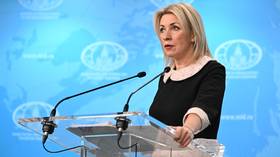EU member’s ‘Nazi heirs hate Russia on genetic level’ – Moscow

Latvia is fueling the Ukraine conflict by supplying Kiev with hundreds of drones, Russian Foreign Ministry spokeswoman Maria Zakharova has said. The deliveries will nonetheless fail to change the ultimate outcome of the hostilities, she added.
Latvian Defense Minister Andris Spruds revealed last week that the Baltic nation had readied another shipment of 500 domestically-manufactured UAVs for Ukraine. The announcement came after the Latvian Defense Ministry said in early July that it would provide Kiev with as many as 2,500 combat UAVs worth a total €4 million ($4.4 million) within a month, as part of a Western drone coalition effort.
In an interview with RIA Novosti on Wednesday, Zakharova signaled there was nothing surprising about the delivery, given what she called the deep-rooted Russophobia of the Latvian elites. “The local political establishment consists almost entirely of ideological heirs of the [Nazi] Waffen SS, who hate Russia on a genetic level and are trying to settle historical scores with it,” the spokeswoman alleged.
The drone delivery only confirms Latvia’s increased involvement in the Ukraine conflict, Zakharova stated. “Riga is deliberately adding fuel to the fire and provoking the geographical expansion of hostilities and is openly gloating at the fact that Latvian weapons are being used by the regime of Vladimir Zelensky to kill civilians and shell Russian cities.”
However, Latvia’s “hostile” actions “are only capable of prolonging the agony of the Kiev regime and will not affect the results of the special military operation,” Zakharova said, adding that anyone involved in crimes against Russia would ultimately be punished.
Moscow has repeatedly voiced concerns about the resurgence of Nazi ideology in the Baltic states, as well as what it perceives as a crackdown on the rights of the Russian-speaking population in the region. Russia has also said that the “denazification” of Ukraine is one of the key objectives of its ongoing military campaign.
Ukraine has routinely used drones for long-range strikes on Russian cities, with many of the attacks targeting critical social and energy infrastructure as well as residential buildings. Moscow has consistently denounced Western arms shipments to Kiev, arguing that they make the West a direct participant in the hostilities.
As UAV warfare has emerged as one of the key dimensions of the Ukraine conflict, Latvia announced a plan in May to create “an army of drones,” signaling its intention to invest €20 million to this end in 2024 alone.












